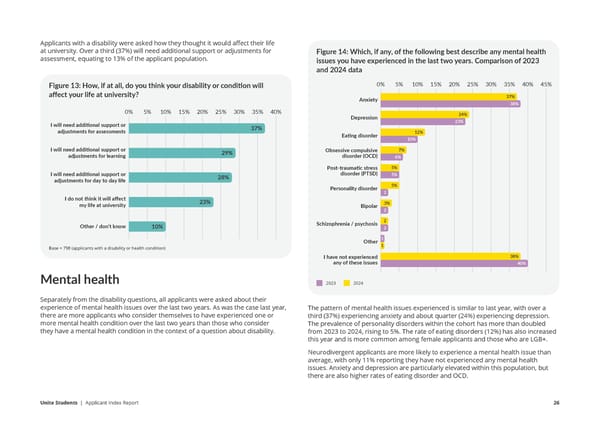Applicants with a disability were asked how they thought it would affect their life at university. Over a third (37%) will need additional support or adjustments for Figure 14: Which, if any, of the following best describe any mental health assessment, equating to 13% of the applicant population. issues you have experienced in the last two years. Comparison of 2023 and 2024 data 0% 5% 10% 15% 20% 25% 30% 35% 40% 45% Figure 13: How, if at all, do you think your disability or condi琀椀on will a昀昀ect your life at university? Anxiety 37% 38% 0% 5% 10% 15% 20% 25% 30% 35% 40% 24% Depression 23% I will need addi琀椀onal support or 37% adjustments for assessments 12% Ea琀椀ng disorder 10% 7% I will need addi琀椀onal support or 29% Obsessive compulsive disorder (OCD) adjustments for learning 6% 5% Post-trauma琀椀c stress disorder (PTSD) I will need addi琀椀onal support or 28% 5% adjustments for day to day life 5% Personality disorder 2 I do not think it will affect 23% 3% my life at university Bipolar 2 2 Schizophrenia / psychosis Other / don’t know 10% 2 1 Other 1 Base = 798 (applicants with a disability or health condition) 38% I have not experienced any of these issues 40% Mental health 2023 2024 Separately from the disability questions, all applicants were asked about their experience of mental health issues over the last two years. As was the case last year, The pattern of mental health issues experienced is similar to last year, with over a there are more applicants who consider themselves to have experienced one or third (37%) experiencing anxiety and about quarter (24%) experiencing depression. more mental health condition over the last two years than those who consider The prevalence of personality disorders within the cohort has more than doubled they have a mental health condition in the context of a question about disability. from 2023 to 2024, rising to 5%. The rate of eating disorders (12%) has also increased this year and is more common among female applicants and those who are LGB+. Neurodivergent applicants are more likely to experience a mental health issue than average, with only 11% reporting they have not experienced any mental health issues. Anxiety and depression are particularly elevated within this population, but there are also higher rates of eating disorder and OCD. Unite Students | Applicant Index Report 26
 Unite Applicant Index Report Page 25 Page 27
Unite Applicant Index Report Page 25 Page 27